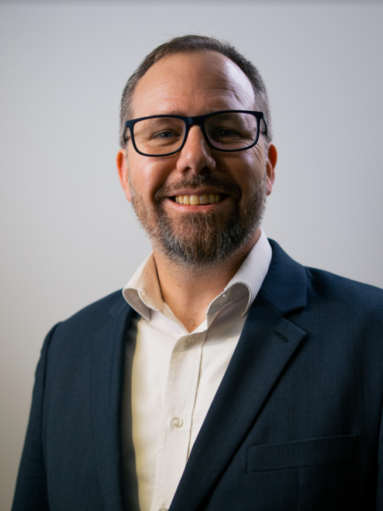Meet the researcher: bridging the gap between academia and entrepreneurship with Prof Che Connon
24 May 2023
Professor Che Connon’s quest to bring cultivated meat closer to dining tables has led to him bridging the gap between academia and entrepreneurship.


Name: Che Connon
Job title: Professor of tissue engineering
Organisation: Newcastle University
Sustainable protein specialism: Cultivated meat
Sustainable protein specialism: Cultivated meat
Professor Che Connon’s quest to bring cultivated meat closer to dining tables has led to him bridging the gap between academia and entrepreneurship.
His interest in cultivated meat began when he saw Mark Post creating the first cultivated burger in 2013, saying even then he recalled seeing how important this fledgling area was going to be – and the role his own chosen field of tissue engineering would be in its development.
Che has headed up pioneering research into recreating the processes that take place within animal bodies, but spotting the potential of this new technology has led to him creating spin-out companies aimed at bringing cultivated meat closer to commercialisation.
After completing a PhD in biophysics focusing on the structure of the cornea, and carrying out a post-doctoral fellowship in Japan, Che spent eight years at the University of Reading as a stem cell scientist, before moving to Newcastle University to become their first chair of tissue engineering.
Eureka moment
His team at Newcastle had been working on a material that could enable cells to detach from a surface, and Che had been trying to work out what it could be used for.
“When you’re trying to place a number of cells together, you’ll always be limited by the surface area,” he explained. “You can’t keep increasing the total surface area to increase cells. But with the system we developed, as soon as a cell detaches from the surface, more space becomes available.
“Then I had a eureka moment. I went back to the work Mark Post had been doing and knew this system would solve a big problem.”
Despite receiving a GFI grant to develop this work, Che found further funding was unavailable as the field was not taken seriously at the time. Instead, Che decided to start a company himself, leading to the creation of CellularREvolution.
The company, now known as CellRev, develops bioreactor technology for continuous processing, using a technique in which cells are able to continuously grow, detach and collect other adherent cells, which can be used in the development of lifesaving therapy as well as help to commercialise cultivated meat.
CellRev has already demonstrated its technology at a pilot scale and plans to make this system available to the market later this year or in early 2024.
Cultivated meat 2.0
Not stopping at one company, Che also founded 3D BioTissues (3DBT), which was originally focused on engineering human tissues for medical use, using the expertise he had developed to carry out the first printing of a cornea for eye transplants.
By forming BSF Enterprises PLC, listed on the London Stock Exchange, he was also able to attract further private investment in the company, recruiting a talented team of researchers and helping drive the development of cultivated meat.
3DBT announced a prototype of the first 100% cultivated pork steak earlier this year – rather than relying on a scaffold made from plant-based materials as commonly used – using a technology Che hopes to eventually be able to license to existing players in the cultivated meat space or those moving into the sector.
“When we talk about meat, we’re talking about how it cooks, how it breaks down,” Che said. “All of this is down to its structure. Our tech is all about directing cells to certain tissues in a matrix arrangement.
“Whole cut is where cultivated meat needs to be. This is the next wave, or cultivated meat 2.0 – it’s about creating products that are more recognisable as meat. Lots of good things are going on with the first generation, but we’re looking at that and seeing people aren’t going to want to eat meatballs forever.”
The company is using similar technology to develop cultivated leather and is in discussions with the fashion industry.
And they have been working on developing serum-free media – the nutrient-rich broth needed to make cells grow – creating the City Mix formula synthesised from the byproducts of agro-forestry and other industries.
3DBT was one of four companies to win a share of the Good Food Institute and EIT Foods’ Cultivated Meat Innovation Challenge aimed at reducing the cost of this media – one of the biggest barriers to commercialising cultivated meat.
Government needs to invest
Following his earlier difficulties accessing research funding, Che says the situation is slowly improving and is pleased 3DBT is working as a partner in the recent CARMA project led by the University of Bath, but adds the UK government need to invest more in cultivated meat research and development.
Being based in the north east of England – highlighted by the Department for International Trade as a possible location for a sustainable protein production hub partly because of its universities – he is a huge believer in the region’s potential.
“The people of the north east have proven time and time again that they can succeed both in commercialising and developing underpinning technologies in this space,” he said.
“It’s a no-brainer for the government to invest more in this space in the north east – particularly when considering the high density of PhD qualified scientists available and the local universities’ proven success in working with the industry.”
Are you interested in getting involved in the sustainable proteins field? Take a look at our resources or check out our science page.
If you’re a researcher:
- To find funding opportunities, check out our research funding database for grants from across the sector, and our research grants page which showcases funding available from GFI.
- Explore our Advancing Solutions initiative, which highlights the main sustainable protein knowledge gaps, and subscribe to the collaborative researcher directory, which provides details of potential collaborators or supervisors with a stated interest in the field.
- Find out about research projects that have already been funded on our research grants tracker or our grantee web pages.
- Look out for monthly science seminars run through our GFIdeas community or use our company database to identify commercial partners.
If you’re a student:
- Find educational courses around the globe through our database.
- Sign up for our free online course introducing the science of sustainable proteins, explore our resource guide explaining what is available to students or newcomers to the space, and check out our careers board for the latest job opportunities in this emerging field.

